Speeches Shim
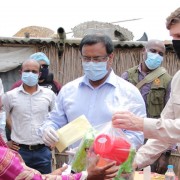
United States Ambassador to Bangladesh Earl Miller visited Madhya Khatiamari village in Gaibandha district with Government of Bangladesh officials to observe U.S. assistance to those affected by the flooding. Ambassador Miller spoke with families receiving emergency assistance provided through the U.S. Agency for International Development (USAID), including cash grants and emergency hygiene kits. He was joined by local administration officials from Gaibandha district and Fulchari upazila, and representatives from CARE Bangladesh and SKS Foundation who are administering this emergency assistance program.
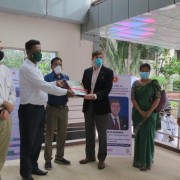
On July 27, 2020, U.S. Ambassador Earl R. Miller visited the 250-bed Tuberculosis Hospital in Shyamoli, Dhaka, to observe how U.S. government-provided GeneXpert machines can detect COVID-19 within 45 minutes and handed over equipment to improve diagnosis of multi-drug resistant TB.
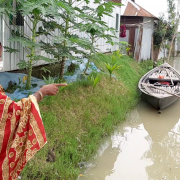
As part of ongoing collaboration among the United States, the Bangladeshi Ministry of Disaster Management and Relief, and the United Nations in Bangladesh, United States Ambassador to Bangladesh Earl Miller announced the U.S. government, through the U.S. Agency for International Development (USAID), is providing assistance to vulnerable families in flooded parts of northern Bangladesh who have lost their homes or livelihoods.
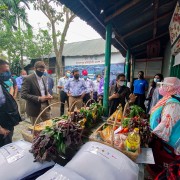
On July 23, 2020, U.S. Ambassador Earl Miller visited and interacted with families in Kalyanpur Bosti receiving food assistance through a new U.S. government program funded by the U.S. Agency for International Development (USAID). Ambassador Miller, joined by Dhaka North City Corporation Mayor Md. Atiqul Islam, observed program staff preparing food baskets for delivery and spoke with people purchasing fresh vegetables at a local shop using the program’s cash transfers.

Today, the U.S. Embassy, through the U.S. Agency for International Development (USAID), released a song entitled “Joy Hobe” to recognize and thank frontline workers who deliver essential services amidst the COVID-19 pandemic. Since the outbreak in March, Bangladeshi frontline workers have been working tirelessly round the clock and risking their own lives, helping people to stay home and prevent the spread of the novel coronavirus disease. This USAID-funded initiative was undertaken by ABC Radio (FM 89.2) as a tribute to these real-life superheroes.
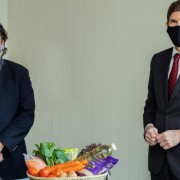
Today, United States Ambassador to Bangladesh Earl Miller; Md. Ashraf Ali Khan Khasru, State Minister of the Ministry of Social Welfare; and Richard Ragan, Country Representative of the World Food Programme launched a new $7 million life-saving food assistance project to help poor households in Dhaka at high risk for the novel coronavirus disease (COVID-19). The program will be funded by the U.S. government, through the United States Agency for International Development (USAID), and implemented by the World Food Programme (WFP), the food-assistance branch of the United Nations and the world’s largest humanitarian organization addressing hunger and promoting food security. This program will complement ongoing efforts by the Government of Bangladesh to respond to the COVID-19 pandemic.
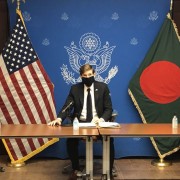
The U.S. government, through the United States Agency for International Development (USAID), is providing more than $173 million in new funding to complement the Government of Bangladesh’s ongoing efforts to respond to the spread of the novel coronavirus disease (COVID-19), including a new food assistance program for 100,000 urban poor living in low-income areas of Dhaka, and to strengthen development activities and post-COVID-19 recovery in Bangladesh.
The U.S. government, through the United States Agency for International Development (USAID) and the U.S. Centers for Disease Control and Prevention (CDC), has provided over $22 million to complement the Government of Bangladesh’s ongoing efforts to prepare and respond to the spread of novel coronavirus disease (COVID-19). This funding builds on more than $1 billion in health assistance provided to Bangladesh over the past 20 years and underscores the long-term U.S. commitment to ensuring access to quality, lifesaving health services for all people in Bangladesh.
The U.S. government recently announced a commitment of $37 million in financing from the Emergency Reserve Fund for Contagious Infectious Diseases at the U.S. Agency for International Development (USAID) for 25 countries either affected by novel coronavirus COVID-19 or at high risk of its spread. The U.S. government is providing these funds to the World Health Organization, other multilateral institutions, and programs led by USAID implementing partners in individual countries. These are the first U.S. government funds committed from a recent pledge of up to $100 million to be used worldwide.


Comment
Make a general inquiry or suggest an improvement.